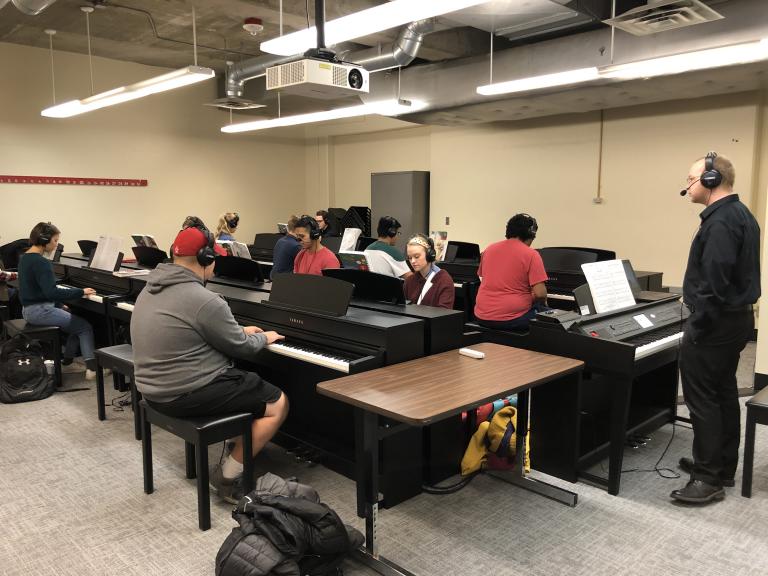Large Piano Lab at GKSOM undergoes transformation
calendar icon19 Nov 2019 user iconBy Brian G Reetz

After 19 years of service, the large Piano Lab in the Westbrook Music Building at the University of Nebraska-Lincoln’s Glenn Korff School of Music was in need of an update. It received a much needed one this fall and now features the latest in technology.
“Digital piano labs have a lifespan of 10-15 years due to wear and tear and evolution of technology,” said Brenda Wristen, Professor of Piano and Piano Pedagogy at the GKSOM, where she directs the piano pedagogy and keyboard skills programs. “Like acoustic pianos, all digital pianos do require some regular maintenance and repair. However, we were starting to see more frequent breakdowns in equipment and more days out of service. Given that our keyboard skills classes are heavily populated, breakdown of equipment means instruments that are either completely unavailable to our students, or only minimally functional. Reliability is very important.
“When selecting this kind of equipment for institutional use, future proofing—thinking about how long the technology is likely to remain current and relevant—is also critical. Our new lab features the latest technology and interconnectivity and should serve us well for many years to come.”
The updated piano lab consists of 17 Yamaha Clavinova digital pianos, fully integrated with a teaching lab module and hub that networks them together. Students plug in headphones at each individual piano, and the instructor can interact with individual students or set up various groupings so that students can interact together. Each student piano has several instrumental timbres, rhythmic tracks, and other features available to help support individual practice. The instructor piano has many enhanced features that allow instructors to load and play pre-recorded MIDI tracks to support the textbook and curriculum, and to build their own accompaniments and tracks to support student playing using innumerable instrumental timbres.
It is possible for the instructor piano to reproduce an entire orchestra. The instructor can broadcast their piano through the network or project the sound outside the network via enhanced speakers. Like all digital pianos, both instructor and student instruments produce a digitally sampled sound electronically. However, unlike most other instruments, these particular Clavinova pianos feature the same action as an acoustic piano, making the touch of these instruments more similar to the acoustic pianos our music majors will encounter in most other settings, Wristen said.
“In addition to the new piano lab in room 23.2, we are also able to replace the projection system and whiteboards in both of our labs (there is a smaller lab located down the hallway in Westbrook),” Wristen said. “The new projectors and WallTalker boards allow us to project and write on the same surface while eliminating glare, allowing instructors to project and interact with music and other images. We were also delighted to get new carpet in room 23.2, replacing the carpet that was, I believe, original to the building!”
Both of the labs are used by Wristen and by 7-to-8 teaching assistants each year for the keyboard skills program.
“We offer classes at four levels that serve to help our music majors build functional piano skills that will serve them in their professional career,” Wristen said. “At any given time, there are approximately 120-150 students enrolled in these classes. Our accrediting agency, the National Association of Schools of Music, requires that all students seeking music degrees meet a piano proficiency requirement as determined by the institution.
“Here in the Glenn Korff School of Music, determining that requirement and ensuring that students meet it is my responsibility. Additionally, the lab in room 23.2 is used by our Community Piano Experience program, which is one of the lab components of our piano pedagogy program and offers recreational piano classes to adult recreational pianists.”